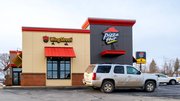News
Consumer focus on value to continue through 2010
November 10, 2009
Restaurant operators are well aware the economic recovery is not immediately following the announcement of the end of the recession. Same-store sales were down for most publicly traded quick-service brands in the third quarter, including U.S. McDonald's stores.
And consumer spending at restaurants is likely to continue to be tight in the coming year as consumers remain fixed on the $5 price point, according to a new survey from global business advisory firm AlixPartners LLP.
Following a study released in March 2009, AlixPartners recently surveyed 1,000 consumers about their current dining habits and expectations for future spending in this sector. The study, recently released at the 2009 Restaurant Finance & Development Conference, found that expectations for the number of dining out occassions will remain the same in the coming year as they have in the past 12 months. However, most consumers plan to spend nearly 20 percent less — an average of $11.49 per meal — than the average spending per meal reported in the study released earlier this year.
"While food quality today remains top of mind for the consumer, the core driver for diners continues to be value, value, value," said Andy Eversbusch, a managing director at AlixPartners and head of the firm's Food Service Practice. "That determines how often people eat out, and where they eat out. Further, this survey suggests that while the industry continues to rely heavily on special discounts to drive traffic, it remains unclear whether this strategy will provide a sustained positive impact."
As more restaurant brands, including many quick-service chains, have rolled out value menus and lowered price points, consumers have become accustomed to the deals.
"Customers have been trained to take specials for granted," said Adam Werner, a director in the Food Service Practice at AlixPartners and one of the authors of the study. "They have recalibrated their spending expectations based on the now-ubiquitous $5 sandwich and the $10 meal, and restaurants that aren't marching in the promotions parade risk being left behind."
The survey asked a representative sample of adults age 18 and above about their current and planned frequency and expenditure on dining out, as well as their preferred type of restaurant and key criteria in restaurant selection. The results include breakdowns by gender, region and income level. Other findings include:
- Sixty-three percent dined out at least weekly over the last 12 months, 11 percent more than in AlixPartners' Q1 survey. In spite of the increased visits, same-store revenue continues to remain flat or declining. Fine Dining suffered the biggest reported drop in overall visits per month over last year.
- Value is still most often cited by consumers as the reason to try new restaurants; promotions are far more important than in the previous survey. However, their overall positive effects on revenue remain unclear.
- Consumer preference continues to be driven not only by price, but by overall food quality, which was again cited as themost important factor in selecting a restaurant.
- Expected average spend in the next 12 months is projected to drop 3 percent as consumers shift more to meals under $5.
The study also found significant differences between the respondents along the lines of gender, annual income and geographic region.
Adam Fless, an AlixPartners director and study co-author, recommends that restaurants commit to a "long-range alignment of kitchen costs and dining experience."
Those brands that fail to re-engineer their menus to offer exceptional value without sacrificing food quality will continue to struggle, he said. "And if they are not able to manage their execution in a way that keeps their margins healthy, survival will be a challenge."
Quick-fixes like cutting margins to unsustainable levels aren't the answer, he warned.
"A talented chef can make good food, and an owner can cut costs," he said. "But only restaurateurs who can do both in a sustainable way, will have a secure future."
 ChatGPT
ChatGPT Grok
Grok Perplexity
Perplexity Claude
Claude








